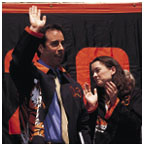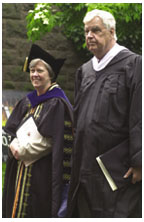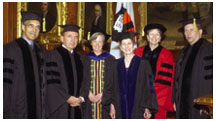July 2, 2003: Features

 Commencement
2003
Commencement
2003
Photographs by Ricardo Barros
Photo: Waving and smiling to friends and family, seniors process on the front campus.
Even after Commencement ceremonies had ended and she waited to join her family as an alum for the first time, Charlotte Walker ’03 couldn’t quite believe her undergraduate days were over. “It will all kick in when I walk through the gates,” said Walker, a history major who soon will head to Niger to work with the relief organization Africare.
Disbelief. Great relief. Unabashed glee. On Commencement day, the 1,812 students who received degrees and their family members had all those emotions, and more. With no public marriage proposals or celebrities receiving honorary degrees, this year’s Commencement ceremony was relatively low-key, but as joyful as ever.
President Tilghman awarded bachelor’s degrees to 1,108 graduates. (Nine bachelor’s degrees were awarded earlier in the year.) About 44 percent of the Class of 2003 graduated with honors. Two hundred sixty students received Ph.D. degrees, and 435 students received master’s degrees in fields such as architecture, engineering, and the Woodrow Wilson School.
As always, teachers also were honored. Four New Jersey secondary school teachers were singled out for their classroom achievements, while four Princeton professors – Robert Gunning (mathematics), Joshua Katz (classics), Harvey Rosen (economics), and Elaine Showalter (English) – received President’s Awards for Distinguished Teaching.
Mainly, though, the day belonged to the graduates. With humor and insight, valedictorian Peggy Ping Hsu recalled the many things she learned outside the classroom, from the perils of deep-frying, to “graduate students are not that scary,” to facing the fear of failure. “Being terrified of giving this speech, and now giving this speech,” she said, “I learned that what I was really scared of was failing to live up to other people’s expectations.”
Speaking to the students, including her daughter, Rebecca, who graduated with a degree in art and archaeology, Tilghman reflected on how much the world has changed since the graduating class entered Princeton; then, the economy was soaring and few people worried about war or terrorism on U.S. soil. “Without question the world you will enter in just a few minutes when you walk out FitzRandolph Gate is a very different place from the day you arrived in Princeton,” she said. “But whatever your elders have accomplished, for good or ill, it is your world – and it is your turn to shape it.” She encouraged students to try to see the world through the eyes of others, and to have the courage “to keep going when everyone else is ready to give up.”
Waiting under the trees before the ceremony began, Keith Mayes Jr., who earned a Ph.D. in American history and has started teaching at the University of Minnesota, said the six years he spent at Princeton were wonderful. Still, anxious to get on with life, he added, “I’m happy it’s over.”
By K.F.G.
|
Anneké Allen gets a last-minute robe check from Alisha Watts. From left, Neil McCann, George Parros, Scott Prime, and Trevor Beaney share a pre-Commencement moment. Former RA Joseph Wang ’01, left, poses with some of his former charges, from left, Seth Dunipace, Miya Tokumitsu, Laurie Dean, Lynne Rosen, Michelle Wu, and Peter Nelson. Ph.D. candidates preparing to receive their hoods: clockwise, from upper left, Zahi Zalloua, Reem Iversen, Sarah-Jane Murray, Karen Ho, and Ellen Thorington. Sarah Rodriguez straightens the hood for Sarah Swords, who pauses with her guide dog, Carley. |
Student speakers

Salutatorian Jesse Liebman

Valedictorian Peggy Ping Hsu
With a wreath of leaves on his head, salutatorian Jesse Isaac Liebman, a classics major, gave the traditional Latin address. A translated excerpt: “When we have cast off these hats, let us not forget certain principles: Prudence, not necessarily Prudential Bank; Fortune, not necessarily Fortune 500; Truth, not necessarily in wine – well, OK, fine, in wine. Finally, and most important, as we each begin to follow our own curriculum vitae, let us not become entangled in our résumés.”
Valedictorian Peggy Ping Hsu, who majored in molecular biology, told her classmates: “My greatest hope for myself and for all of you is to be perpetually idealistic. Not a naïve idealism, but an educated one. From our studies at Princeton, we should know by now that most interesting and pertinent problems have complex solutions. . . . But we should all hold some ideal in our hearts, some vision for our world and for our own lives. And we should strive for this ideal in the face of possible and even likely failure.”
 Class
Day 2003
Class
Day 2003
“These of course are just jokes. For it is no joke that you must face the future of the 21st century. For only by facing the future, will you ultimately understand what the future holds, which brings me to the subject of my mother . . . ,” comedian and television icon Jerry Seinfeld h’03 told the Class of 2003 during his monologue on a sunny Class Day June 2. After his talk, senior class president Catherine Farmer ’03 gave Seinfeld a class jacket, and he tried – only half successfully – to join in the singing of Old Nassau. At the ceremony, 18 seniors received awards for their academic, service, and athletic achievements. Visit www.princeton.edu/paw for a complete list.
 Baccalaureate
Baccalaureate
Fred Hargadon, the outgoing dean of admission, and President Tilghman walk toward the Chapel in the Baccalaureate procession. “Dean Fred,” who has admitted more than 17,500 students to Princeton, told the seniors that the University’s unofficial motto —- “Princeton in the nation’s service and the service of all nations” — means “using what you know and the resources at your disposal in as public-spirited a manner and as generously as possible on behalf of others — in other words, to be a good citizen in the broadest sense of that term. That, I would like to think, is the special message written in invisible ink on a Princeton diploma.”
The Baccalaureate ceremony may be viewed at www.princeton.edu/WebMedia/ special/.
 Honorary
degree recipients
Honorary
degree recipients
Photo: From left, Claude M. Steele, Richard J. Goldstone, President Tilghman, Natalie Zemon Davis, Joan Argetsinger Steitz, and Lawrence H. Summers. (Denise Applewhite)Five people received honorary degrees in recognition of their achievements. (Italicized quotes are from their citations.)
NATALIE ZEMON DAVIS, DOCTOR OF HUMANITIES: Princeton history professor emerita and professor at the University of Toronto. Her many works include The Return of Martin Guerre, which was made into a film, and Women on the Margins, which explores creativity through the eyes of three women in different cultures. “Not content to write about women on the margins, she has guided them to the center of university life; and she has enriched the university by opening it up to talent and ideas beyond the confines of disciplines and conventions.”
RICHARD J. GOLDSTONE, DOCTOR OF LAWS: An internationally known expert on constitutional law and human rights. Goldstone led South Africa’s Commission of Inquiry, which studied the widespread violence in South Africa, and served as chief prosecutor of the United Nations International Criminal Tribunals for Rwanda and the former Yugoslavia. “His jurisprudence smoothed the transition from apartheid to democracy and vigilantly safeguarded (South Africa’s) young constitution. Although much of the world closed its eyes to the genocide in Rwanda and Bosnia, he reminded us that a political leader who seeks to destroy an entire people must be held accountable.”
CLAUDE M. STEELE, DOCTOR OF HUMANITIES: Lucie Stern Professor in the Social Sciences at Stanford University. A psychology professor, Steele has focused on alcoholism and other addictions, and on the impact of stereotypes. “His penetrating analysis reveals the burden borne by African-American students and by women who seek to excel in domains in which society questions their abilities and encumbers them with negative expectations.”
JOAN ARGETSINGER STEITZ, DOCTOR OF SCIENCE: Scientist and Yale University professor. Steitz’s research into ribonucleoprotein particles may lead to better diagnosis and treatment of autoimmune diseases. She has been a role model for young female scientists. “Through her precise experiments, she discovered the biochemical mechanisms that allow the cell to make sense from nonsense in the genome.…She has opened the door for other women to follow her into the front ranks of research and teaching in the sciences.”
LAWRENCE H. SUMMERS, DOCTOR OF LAWS: President of Harvard University
and former secretary of the U.S. Treasury. An honored economist, Summers
became Treasury secretary in 1999; among other things, he helped engineer
a pay-down of the national debt and worked to enact sweeping financial
deregulation. “As a public servant . . . he was a steward of our
nation’s economic well-being. . . . As president of our pre-eminent
sister institution on the Charles, he is now entrusted with assets more
valued than gold . . . ” ![]()





